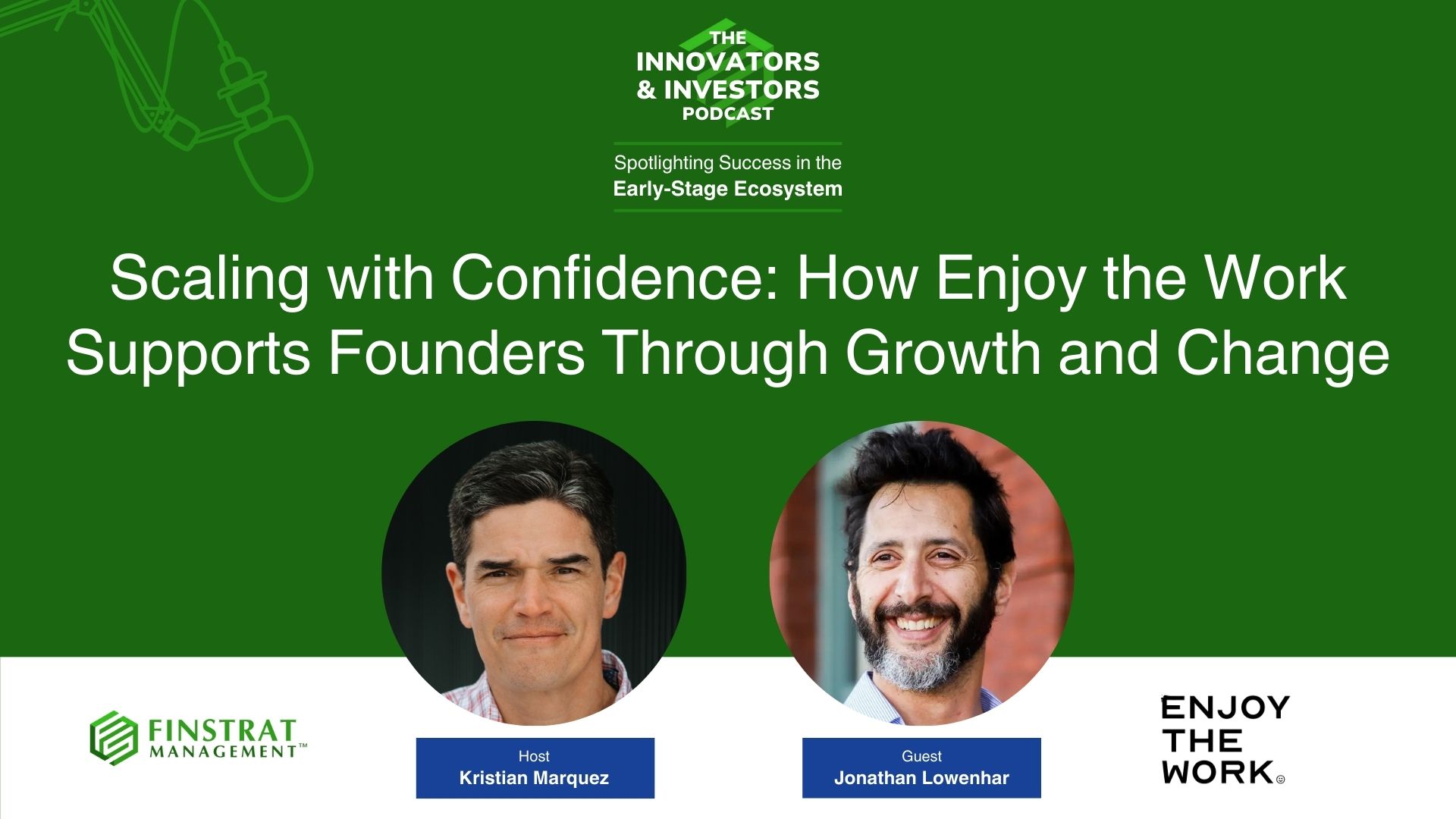Founder-Driven Sales Build Product Success: Jonathan Lowenhar Founder of Enjoy the Work
October 14, 2025 MIN

Highlights
- Founders often get fired not for lack of vision but due to lack of operational CEO skills.
- Investor boards frequently replace founders prematurely because they lack tools to support their growth.
- Founding a company is about courage and character; running it demands distinct, teachable skills.
- Enjoy the Work helps founders develop CEO skills to maintain control and choose their own exit.
- The pandemic shifted founder priorities toward health, profitability, and sustainable growth.
- Alignment and shared narratives between founders and boards are critical for startup success.
- Founder-driven sales and iterative problem-solving remain key to early-stage startup validation.
Summary
In this episode of The Innovators and Investors Podcast, host Kristian Marquez interviews Jonathan Lowenhar, founder and managing partner of Enjoy the Work, about his journey in startup leadership and the critical challenges founders face when transitioning from early-stage entrepreneurs to effective CEOs. Jonathan shares his foundational insight that many founders get fired not due to lack of vision or dedication but because they are unprepared for the operational demands of scaling a company. He explains how investor boards often resort to firing founders prematurely due to misaligned expectations and a lack of support in developing essential CEO skills.
Jonathan’s career journey, from casino operations to fintech startups, informs his understanding of leadership and operational discipline. He highlights the stark difference between founding a company—characterized by courage and experimentation—and running a company, which requires mastering a different set of skills around execution, financial management, team building, and board relations. Enjoy the Work was created to fill this gap by providing founders with the tools, coaching, and frameworks necessary to succeed on their own terms and avoid being ousted.
The conversation also touches on the evolving landscape of startup leadership post-pandemic, including a greater focus on founder health, mental well-being, profitability, and cash flow management over pure fundraising. Jonathan emphasizes the importance of alignment between founders and boards on business goals—whether fundraising, profitability, or M&A—and the necessity of clear communication and shared narratives to prevent costly dysfunction.
Jonathan shares success stories, such as Tipalti, which evolved from a founder-driven startup to a multi-billion-dollar fintech powerhouse, underscoring the power of founder-led validation and iterative customer-focused product development. He concludes with personal insights on discipline, avoiding destructive comparison, and the influence of his entrepreneurial father, encouraging founders to embrace daily discipline and find joy in their unique paths.
Key Insights
- The Founder’s Paradox: More Success Increases Risk of Losing Control
As startups grow and take on more capital, control shifts from founders to investors, increasing the risk of founders being ousted. This paradox highlights a systemic challenge in venture-backed startups where founders’ initial vision and operational control erode as companies scale, underscoring the need for founders to acquire the skills to maintain influence beyond early stages. - Operational CEO Skills Are Unlearned and Unsupported
Jonathan’s interviews with investors revealed a gap: while they idolize founder traits like persistence and insight, their expectations for startup CEOs focus heavily on execution skills—financial planning, fundraising, product management, sales, and board management. No formal training exists for founders to acquire these skills, leaving them vulnerable to failure or replacement. - Boards Often Pull the ‘Fire the CEO’ Lever Prematurely
Investor boards typically have limited operational experience and rely on lagging indicators like financial forecasts to assess performance. When results fall short, firing the CEO is the default solution. This approach ignores underlying causes and misses opportunities to coach and develop the founder, often leading to unnecessary disruption and loss of founder-driven momentum. - Alignment Between Founder and Board Is Crucial but Rare
A core challenge is ensuring that the founder and board operate with “one story” about the company’s goals and progress. Misalignment breeds mistrust and dysfunction, threatening the startup’s survival. Enjoy the Work emphasizes working backwards from a clear milestone—whether profitability, fundraising, or M&A—and aligning expectations to create transparency and trust. - Founders Need Support Beyond Capital: Training and Coaching
While investors provide introductions, strategy advice, governance, and capital, few offer direct training to founders. Enjoy the Work fills this void by helping founders build practical execution plans, such as hiring sales leaders, developing ramp plans, and creating commission structures—bridging the gap between strategic decisions and operational execution. - The Post-Pandemic Era Has Changed Founder Priorities
The pandemic underscored the fragility of venture capital availability, forcing many founders to focus on cash flow, profitability, and operational resilience. Simultaneously, mental health and wellness have become less stigmatized in the startup community, with widespread adoption of coaching and therapy, reflecting a healthier approach to founder sustainability. - Founder-Driven Sales and Customer Validation Remain Foundational
The story of Tipalti illustrates the power of a founder personally solving a customer problem and iterating on a product before scaling. This hands-on, problem-first approach builds a strong product-market fit and lays the groundwork for sustainable growth and eventual acquisition strategies, reinforcing the importance of founders staying close to their customers early on.
Additional Reflections
Jonathan’s personal journey—from a casino executive to a startup CEO and then founder coach—illustrates the power of diverse experience and pattern recognition in leadership. His reflections on discipline as a “gift to yourself” and the futility of comparison offer timeless wisdom for founders navigating the highs and lows of entrepreneurship. The example of his father’s entrepreneurial discipline and improvisation roots this wisdom in family legacy and the broader fabric of entrepreneurial resilience.
Enjoy the Work’s decade-long evolution underscores a growing awareness that startup success depends not only on capital and ideas but on the sustained development of founder leadership—turning the often lonely, reactive journey of founders into a supported, proactive path toward mastery and choice.
Stay up-to-date with Jonathan Lowenhar and his work with Enjoy the Work.
Follow our show on your podcast channel of choice or listen below.




